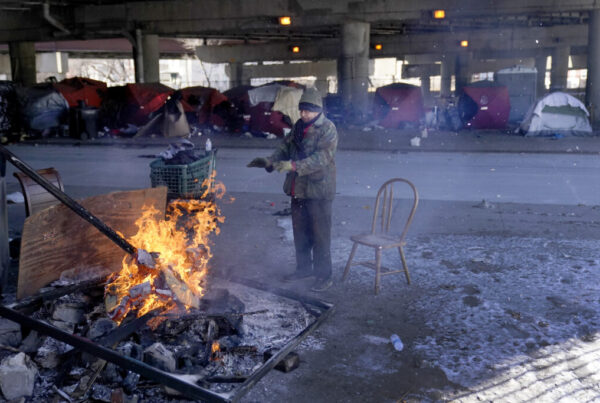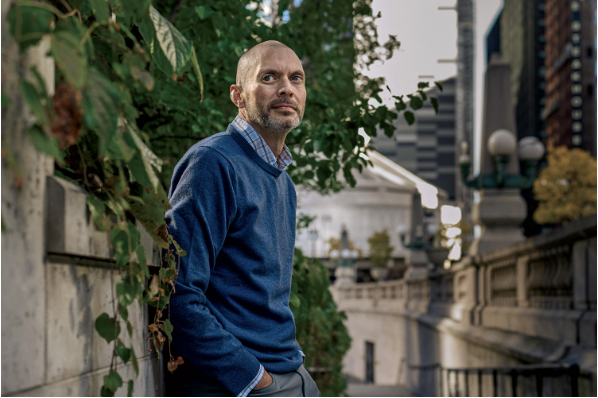One homeless man — a former college academic adviser — says the homeless community’s health problems should concern everyone: ‘We’re out there. We’re riding public transportation.’
The city of Chicago is considering making hotel rooms available to homeless people during the coronavirus crisis to try to prevent the spread of the disease among that particularly vulnerable population.
Homeless services providers were informed of the city’s emergency planning during a webinar presentation Friday conducted by officials from three city agencies.
Several California cities have taken steps toward using hotel rooms to house the homeless during the crisis.
Chicago officials are exploring the availability of other facilities that could be used temporarily to get homeless people off the street or out of crowded shelters.
Though no homeless person is known to have tested positive for the coronavirus in Chicago, officials want to identify potential isolation facilities where those individuals could be housed.
A city spokesperson said city departments are trying to identify alternative locations to provide emergency shelter for homeless individuals but did not directly address questions about using hotels.
Shelter operators and advocates who have been pressing the city to take preventive action are encouraged.
“They are very much responding to provider concerns,” said Richard Ducatenzeiler, executive director of Franciscan Outreach, one of the city’s largest providers of homeless services. “I’m very optimistic and confident the city is doing everything possible.”
Just a few days ago, social service agencies complained of a lack of preparedness.
The problem is obvious. How are homeless people supposed to safely “shelter in place” or practice “social distancing” when their only home is a group-style shelter or if they have no home at all and are living in encampments on the street?
Most homeless shelters sleep their guests congregated in large, open rooms with beds only a few feet apart to maximize capacity.
Under normal circumstances, homeless people living on the street face special challenges maintaining hygiene. The extra level of attention needed to protect against the spread of this virus is nearly impossible for them.
On top of that, many homeless people fall into the at-risk category for the coronavirus because they are older than 60 or have underlying health conditions. Ducatenzeiler said probably one-third of the people staying in Franciscan Outreach’s three shelters — which has 382 beds — could be categorized as at-risk.
Ducatenzeiler said he has urged the city to reduce the number of homeless individuals staying at his facilities, but that requires finding them another place to stay.
That’s why hotel rooms are under serious consideration.
Ronald Matthews, 65, is among the homeless people worried about contracting the virus. Matthews has been homeless since 2015 and has stayed most nights since July at Pacific Garden Mission, just south of the Loop.
But in the past two weeks, Matthews has taken to using his Social Security retirement benefits to check himself into a hotel because of his health concerns.
“Being my age, I never readily admitted being fearful of anything,” said Matthews, a former academic adviser at two local universities. “This frightens the hell out of me.”
Matthews, who was hospitalized for pneumonia Christmas Eve and once suffered a collapsed lung, said the hotel has been great but that he’s running out of money — and using up funds he hoped to put toward an apartment.
“This is not the wisest use of my funds, but, for my sanity, it’s imperative,” he said.
Matthews said the health problems of the homeless community should concern all Chicagoans.
“We’re out there. We’re riding public transportation,” he said.
Chicago Coalition for the Homeless developed a lengthy set of recommendations for government action but said the two most critical are to create isolation housing for at-risk homeless people and to “de-concentrate” the number of people in shelters.
Julie Dworkin, policy director for the coalition, said the city would need 2,800 hotel rooms to get homeless people off the street and relocate the at-risk individuals now living in shelters.
Dworkin said the coalition is encouraged by the moves the city has made in recent days, but she cautioned, “There is nothing concrete yet and no clear plans for what will happen if a single case or, in the worst-case scenario, an outbreak happens in a shelter.”
The city has to balance an extraordinary number of competing concerns, but looking out for homeless people needs to be on the urgent list.






